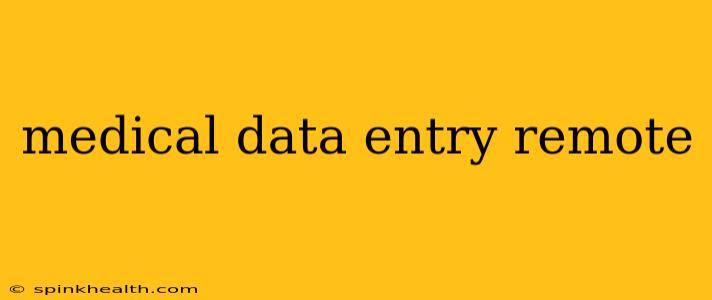The hum of the keyboard, the quiet satisfaction of meticulously organized data, the flexibility to work from anywhere – this is the reality for many medical data entry professionals working remotely. But the world of remote medical data entry is more than just typing; it's a vital cog in the healthcare machine, requiring accuracy, attention to detail, and a commitment to patient privacy. This comprehensive guide will delve into the intricacies of this career path, answering your burning questions and helping you determine if it's the right fit for you.
What is Medical Data Entry?
Imagine a bustling hospital or clinic, overflowing with patient records, lab results, and physician notes. Medical data entry professionals are the unsung heroes who organize this deluge of information, transforming handwritten scribbles and digital fragments into clean, accessible, and secure databases. They’re the bridge between the raw data and the streamlined systems that healthcare providers rely on for diagnosis, treatment, and research. This crucial role ensures the smooth flow of information within the healthcare system.
What are the Requirements for Remote Medical Data Entry Jobs?
While specific requirements vary depending on the employer and the complexity of the work, several core skills and qualifications are universally valued. Let's explore the essentials:
Essential Skills:
- Typing Speed and Accuracy: A high typing speed (ideally 60 WPM or more) with minimal errors is paramount. Accuracy is even more crucial than speed – one misplaced digit can have serious consequences.
- Medical Terminology: A strong understanding of medical terminology, abbreviations, and procedures is essential for accurate data entry. Many employers offer training, but a foundational knowledge is advantageous.
- Data Entry Software Proficiency: Familiarity with various data entry software, electronic health record (EHR) systems, and medical billing software is typically required.
- Attention to Detail: This cannot be overstated. Medical data entry demands meticulous attention to detail to ensure accuracy and avoid costly errors.
- Strong Computer Skills: Proficiency in using computers, navigating various software programs, and troubleshooting basic technical issues is crucial.
- Medical Record Confidentiality: A deep understanding and strict adherence to HIPAA (Health Insurance Portability and Accountability Act) regulations regarding patient privacy and data security is mandatory.
Education and Experience:
While a formal medical education isn't always required, a high school diploma or equivalent is typically the minimum. Experience with medical data entry, even in a volunteer capacity, can be a significant advantage. Certifications in medical coding or billing can also boost your chances of securing a desirable position.
What are the Responsibilities of a Remote Medical Data Entry Specialist?
The day-to-day responsibilities can vary widely based on the specific employer and project. However, some common tasks include:
- Entering patient demographics and medical history into EHR systems.
- Transcribing physician notes, lab results, and other medical documents.
- Coding medical procedures and diagnoses using standardized coding systems (e.g., ICD-10, CPT).
- Maintaining accurate and up-to-date patient records.
- Ensuring compliance with HIPAA regulations.
- Identifying and reporting any discrepancies or errors in the data.
- Collaborating with other members of the healthcare team.
How Much Do Remote Medical Data Entry Professionals Earn?
Salaries for remote medical data entry professionals vary based on experience, location, and employer. Entry-level positions may offer hourly rates, while more experienced professionals may command higher salaries and benefits packages. Online salary aggregators provide up-to-date information on average earnings in specific regions.
What are the Best Places to Find Remote Medical Data Entry Jobs?
Numerous avenues exist for finding remote medical data entry opportunities. These include:
- Online Job Boards: Sites like Indeed, LinkedIn, Monster, and specialized healthcare job boards are excellent resources.
- Company Websites: Check the career pages of hospitals, clinics, medical billing companies, and other healthcare organizations.
- Freelance Platforms: Platforms like Upwork and Fiverr may offer freelance data entry projects.
- Networking: Connecting with professionals in the healthcare industry can lead to valuable leads.
What are the Pros and Cons of Remote Medical Data Entry?
Like any career path, remote medical data entry has its advantages and disadvantages:
Pros:
- Flexibility: Set your own hours and work from anywhere with a reliable internet connection.
- Work-Life Balance: Better control over your schedule, leading to a healthier work-life integration.
- Remote Work Opportunities: Access to a wider range of jobs, not limited by geographical location.
- In-Demand Skill: The demand for medical data entry professionals continues to grow.
Cons:
- Sedentary Lifestyle: Requires prolonged periods of sitting, potentially leading to health issues.
- Potential for Eye Strain: Constant screen time can cause eye strain and fatigue.
- Potential for Isolation: Working from home can lead to feelings of isolation if not managed effectively.
- Accuracy Demands: High levels of accuracy are critical; errors can have serious consequences.
What Training or Certification is Helpful for Remote Medical Data Entry Work?
While not always mandatory, several certifications can significantly enhance your job prospects and earning potential:
- Certified Medical Assistant (CMA): Offered by the American Association of Medical Assistants (AAMA).
- Registered Medical Assistant (RMA): Offered by the American Medical Technologists (AMT).
- Certified Coding Specialist (CCS): Offered by the American Health Information Management Association (AHIMA).
- Certified Professional Coder (CPC): Offered by the American Academy of Professional Coders (AAPC).
The world of remote medical data entry presents an exciting blend of flexibility and purpose. By understanding the requirements, responsibilities, and potential challenges, you can make an informed decision about whether this rewarding career path is right for you. Remember, accuracy and attention to detail are paramount, but with the right skills and dedication, you can contribute significantly to the healthcare landscape while enjoying the freedom of remote work.

